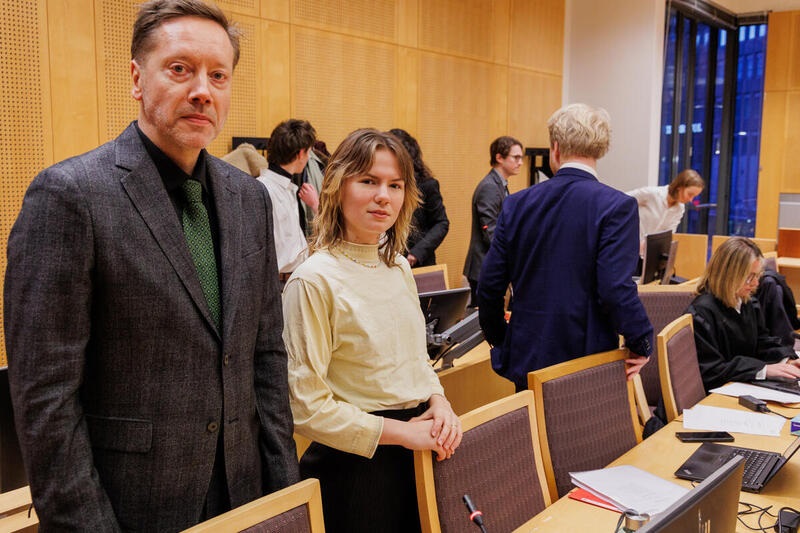A recent ruling by the UK’s top court will make it harder for new fossil fuel production projects to get approval across Europe and beyond – and is already influencing a separate court case this week over a new coal mine in England, climate campaigners and legal experts told Climate Home.
On June 20, the Supreme Court in London ruled that, in deciding whether to approve a new oil well in Horse Hill in southern England, the authorities must consider the greenhouse gas emissions from burning the oil, not just the much smaller volume of emissions from getting the oil out of the ground.
Announcing what has been called the “Finch ruling”, Judge George Leggatt said: “The emissions that will occur on combustion of the oil produced are ‘effects of the project’ because it is known with certainty that, if the project goes ahead, all the oil extracted from the ground will inevitably be burnt, thereby releasing greenhouse gases into the Earth’s atmosphere in a quantity which can readily be estimated.”
Where East African oil pipeline meets sea, displaced farmers bemoan “bad deal” on compensation
The ruling has already helped campaigners challenge a planned coal mine in Cumbria in the north of England, set to provide fuel for steel-making. The UK’s new Labour government said last week that the previous Conservative government had made an “error in law” when approving the mine and withdrew support for the mine’s developer in a separate court case being heard this week.

Campaigners against the Cumbria coal mine oppose bringing “zombie” coal back from the dead on July 16, 2024 (Photo: Friends of the Earth)
Speaking during a break in that case, Friends of the Earth lawyer Katie de Kauwe said the Finch ruling had strengthened the green group’s legal argument against the coal mine. The mine’s developer – which is still defending the case – did not assess the emissions from burning the coal and, in the wake of the Finch ruling, “we believe it’s very clear that was unlawful”, she told Climate Home.
The ruling is likely to resonate beyond the UK, she added, because it concerns regulations that are derived from European Union (EU) law. Although the UK has left the EU, many of its laws remain similar.
Greenpeace Norway campaigner Halvard Raavand said his colleagues had “a small celebration” in their Oslo offices when the Finch ruling was handed down, popping bottles of alcohol-free champagne. “It’s highly positive,” he said. “We’re very, very relieved – it shows it’s possible to take on fossil fuels and win.”
New South African government fuels optimism for faster energy transition
Like the UK, Norway is not an EU member but bases much of its law on that of the bloc. Greenpeace Norway is challenging in court its government’s approval of three new oil and gas fields, arguing that they failed to properly consider the climate impact from burning the fuels – known as scope 3 emissions.
Raavand said that, while Norway and the UK’s national courts are not related, Norwegian judges are likely to consider the UK’s judgement as a precedent. “Other courts across Europe might look to each other too,” he said.

Gina Gylver, head of Natur og Ungdom (Young Friends of the Earth Norway), and Frode Pleym, head of Greenpeace in Norway in Oslo District Court on November 28, 2023 (Photo: Rasmus Berg/Greenpeace)
Over in Amsterdam, Dutch Friends of the Earth campaigner Sjoukje van Oosterhout also celebrated the Finch ruling. “This verdict sets an important precedent,” she told Climate Home. “Judges worldwide will be looking at this.” She said it could boost campaigners’ legal challenge to Dutch company One Dyas’ plans to drill oil in the Wadden Sea, part of the North Sea.
Climate law professor Harro van Asselt said the UK ruling was “important” and “may well have implications for EU member states considering licensing fossil fuel projects”. He added that judges had made similar rulings in Australia and Norway in the last few years – although the Norwegian case, which influenced the Finch ruling, is under appeal.
While its ripple effects will be strongest in the EU and countries with similar laws, van Asselt said he would not exclude the possibility of the Finch ruling influencing court judgements elsewhere, in particular in common-law countries like Australia. Common law is a legal system that evolves based on judges’ rulings, generally found in former British colonies like the US, Canada and New Zealand.
De Kauwe of Friends of the Earth added that the Finch ruling could influence environmental impact assessments across the world.
Most of the oil and gas being extracted in Europe (red) or discovered, or under development (blue), is in the North Sea (Picture: Global Energy Monitor/Screenshot)
The recent change in government in the UK is also likely to hamper new fossil fuel production projects in the country. Keir Starmer’s Labour Party was elected on a manifesto promising to ban the method of gas extraction known as fracking and not to issue new licenses to explore new oil and gas fields or grant new coal mining licenses.
Gareth Redmond-King is the international lead at the Energy and Climate Intelligence Unit advocacy group. He told Climate Home that, at last year’s COP28 climate summit, British politicians heard from Global South government negotiators that politicians in their countries had cited the UK’s decision to issue new North Sea oil and gas licences as justification for pursuing their own fossil fuel exploration. That excuse has now been taken away, he said.
“Leadership works both ways,” he added. “The precedent set by this [Labour] decision makes it harder for fossil fuel companies to justify drilling in other countries. The UK is now the first G7 country to have pledged to put a moratorium on new exploration. That’s a big step.”
(Reporting by Joe Lo; editing by Megan Rowling)
